A man dies of an overdose. Then chaos ensues at his swank Seattle apartment building
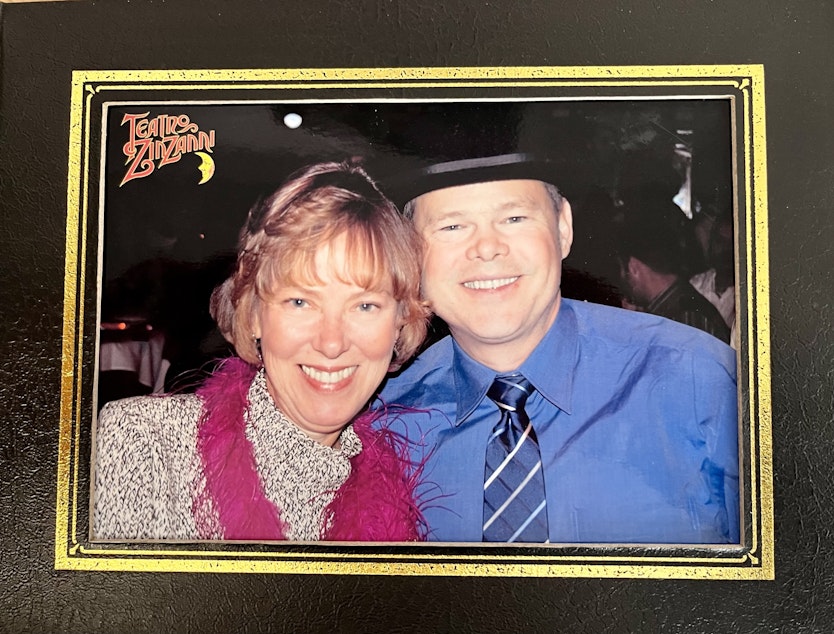
I. The two faces of Janus
Bobby Hawran was a retired longshoreman with a handsome face and an even handsomer pension.
In April 2021, Hawran, 62, moved into an apartment building in north Seattle. The new building was named Janus, for the Roman god of beginnings and endings, and the duality between war and peace — a metaphor for Hawran’s short time in the building if there ever was one.
Hawran lived on the ground floor, with a quiet patio facing an alley. He was a stone’s throw, almost literally, from the bungalow where he’d grown up, molded in his father’s image as a man loyal to the waterfront, although perhaps more loyal to the drink. He was known for being as generous as he was hardworking, with the chiseled body of Stallone and the face of Redford — his looks, in particular his blue eyes, were described by everyone I interviewed about him.
On the day Hawran moved in, staff clocked him as an easy tenant, if a bit bumbling, who could afford the $2,150 rent for a one-bedroom.
Hawran stopped paying rent that summer. He gave the building manager no reason other than saying vaguely, “She was supposed to take care of it.” He didn’t say who “she” was.
Sponsored
There was little management could do. It was the dog days of the coronavirus pandemic, and an eviction moratorium was firmly in place.
A year and a half after moving in, Hawran lay barely conscious on his living room floor. Paramedics arrived within minutes of the 911 call and wheeled him out of the Janus on a stretcher.
Hawran died the next day, Aug. 5, at a Seattle hospital. The cause was an accidental overdose of fentanyl, methamphetamine, and an opiate that was likely heroin.
It was the first domino to fall.
II. Greenwood
Sponsored
It’s easy to feel nostalgia for the gritty Seattle of yore, but it was a less gentle time. Landlords evicted tenants for being a dollar short and a day late, and cops could haul you off for a baggie of weed.
Hawran’s life epitomized old Greenwood, a small, north Seattle neighborhood, with its fish market, dusty trinket shops, and the Baranof serving free soup from a pot at the bar.
The waterfront, where Hawran had worked as a longshore worker since he was 15, was saltier still. Michael Wagner, a friend and coworker of Hawran’s, described the port as awash in drugs and booze.
“When we started on the waterfront, a lot of the A-men came in with pints in their back pocket and a 12-pack in their hands, and that was to get through four hours,” Wagner said. (A-men are the upper tier of longshore workers.) “It’s not the way it is today, but it’s the way it was.”
By all accounts, Hawran lived a painstakingly disciplined life until his early 30s.
Sponsored
He practiced karate, lifted weights, and skied. He climbed Mount Rainier and drove a Corvette, and if someone he knew needed a place to stay, he invited them in.
“This was part of his problem,” said his sister Bobbie Reagan (yes, they share a name). “They would stay too long, and then he had to get rid of them.”
Jack Block Jr., a retired longshore crane operator, said Hawran had a heart of gold. “He’d give you the shirt off his back,” he said.
As Hawran sank deeper into addiction, he moved in with a woman in a dilapidated shoebox of a house in Greenwood. Wagner said it wasn’t a romantic partnership, but he wouldn’t say more.
Court records show the roommate had been charged multiple times with selling drugs, most recently in 2010, when she was sentenced to 14 days in jail.
Sponsored
When the woman got cancer, Hawran moved across the street to the Janus apartments. The Janus is new Greenwood, home to young attorneys and creatives and their rescue dogs. The building has a brightly lit common area with a cheery kitchen and a giant TV for game days.
Within weeks of moving, Hawran was joined by a middle-aged woman, her preschool-aged son, and the child’s father, who residents dubbed “The Big Man.”
The woman didn’t fit in. She was brusque, loud, and made snide remarks to tenants who asked her to latch the back gate. Without a key to the building, she would bawl from the alley, “Bobby! Open the fucking door.”
Who the heck was she?
Everlyn Animas, the no-nonsense building manager, said the woman claimed to be Hawran’s caretaker.
Sponsored
Animas was skeptical. The woman disappeared for months at a time, leaving her child and The Big Man with Hawran.
Once, Animas saw Hawran trying to buzz himself into the building.
“Where’s your key fob, Bobby?” she asked.
Hawran told Animas that his guests had it. “I was just supposed to help them get their own place, but they won’t leave,” he said, according to Animas.
“That’s not something I can take care of for you,” Animas said she told Hawran. “If you do want to do something about it, you need to call police.”
The mention of police seemed to make Hawran nervous, she said, and he hurried past her.
Meanwhile, Nathan McLellan, a resident, noticed unusual behavior around the building. The first was The Big Man and the child playing with toy cars in the foyer at 2 a.m. Shouldn’t the child be asleep, McLellan wondered?
Another time, McLellan walked into the common area and saw a redhead with a Matt Hasselbeck jersey facing the sink.
“He turns around, and in his hand, I see the orange tip,” McLellan said, referring to the cap of a hypodermic needle. “I started yelling at him, like, ‘Get the fuck out of here; what are you doing?’”
McLellan noticed Hawran across the room, sitting quietly.
“As I’m yelling at him, Bobby gets up and leaves,” he said. “He just slinks out the door, and he’s gone.”
III. Death of a Longshoreman
The day before Hawran was taken out on a stretcher, Aug. 3, he wouldn’t open the door. According to neighbors who overheard, the woman begged him for an hour to let her in. “Bobby, please,” she said. “We’ll get your money.”
Maria Paleologos, who lives in the unit next door, called the scene “vivid and jarring.”
At 8 p.m. the next evening, the woman called 911 from Hawran’s cell phone, according to Seattle Fire records. She told a dispatcher that she’d been out, and that when she returned that evening, Hawran was on the floor.
“We’re seeing a 62-year-old male who was last seen by his roommate six hours ago,” a medic radioed. (Hawran had in fact just turned 63.)
Hawran died at Harborview Medical Center the next day, Saturday.
On Sunday, his debit card was used to withdraw the daily maximum. When his sister closed the account five days later, roughly $12,500 had been withdrawn. The transactions had taken place at the bank in the Janus building, and at the Fred Meyer grocery store across the street.
IV. Dominoes fall
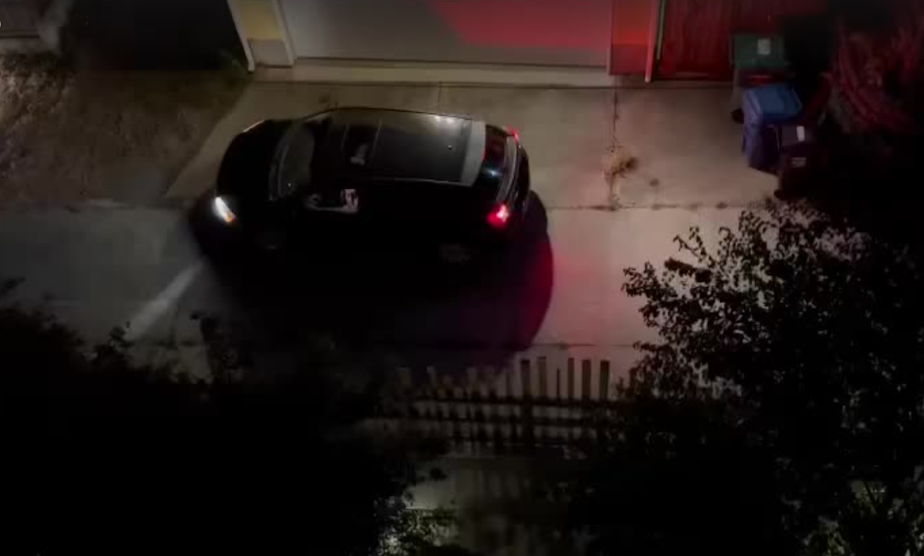
Residents said Hawran’s death marked an uptick in activity around the Janus.
After Hawran died, a desk and chair appeared on the sidewalk across the street, by the Bartell Drugs. Odd, but also harmless. Within three weeks, it morphed into a homeless camp.
Seattle, like many major West Coast cities, has sidewalks lined with tents inhabited by people who can’t make rent. Most of these encampments develop their own discrete ecosystem, but this one seemed to have an invisible thread leading to the Janus.
People crossed the street to Janus alley and shouted for the woman. They would whistle, honk, and throw rocks to get her attention.
V. Collecting evidence
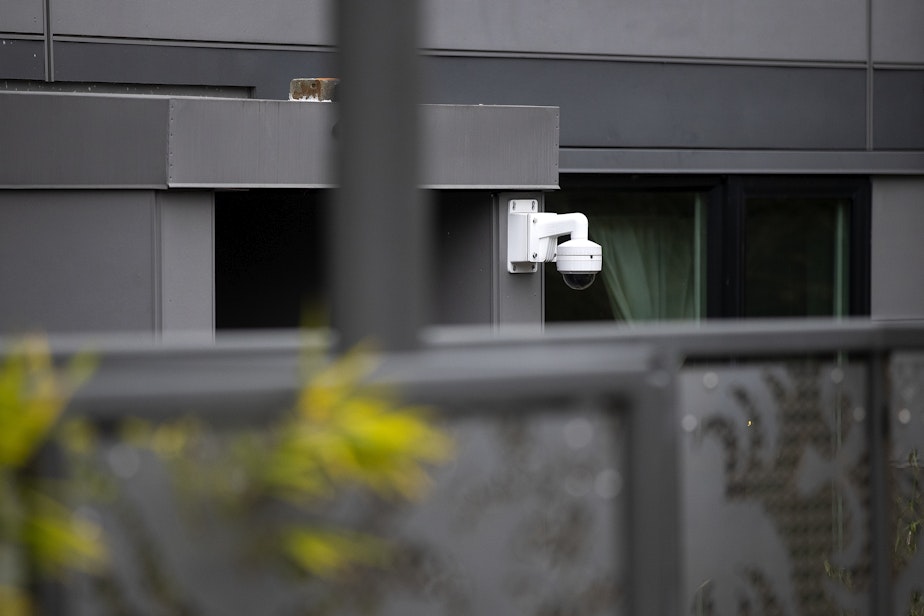
One month after Hawran’s death, residents and nearby homeowners got organized.
In complaints to police and Janus management, they said the situation was out of hand. People were shooting up on their back stairs; someone had threatened a resident with bear mace; someone else told a resident, “I’m going to fuck you up.”
They started a text chain with 20 or so people to alert each other to alley goings-on. “I heard whistling,” a message might read, according to tenants. “Listening,” another would say.
Repeat visitors got nicknames: Mean Redhead, Camo Cap, Headphones Guy, Short Pants.
The neighbors set up high-resolution cameras on their balconies and garages, pointed at the alley; they then cataloged the footage, which they shared with Seattle Police and City Council staff.
“The neighbors and the residents, they did everything they could; it’s incredible,” said Yishu Xu, who works for Security Properties, which includes the Janus.
Janus management would ask for videos, Xu said, and residents would say, “Whatever incidents you want, we will find the date, and we’ll get that right away.”
The videos I watched do not show explicit drug transactions.
In one, the woman walks to the driver’s side window of a car in the alley. The driver peels off several bills from a wad of cash and hands it to her. Other footage shows a stream of visitors and car traffic.
Residents emailed building management, police, and their council members. They felt certain the woman was dealing drugs, they said. Plus, rent hadn’t been paid on the unit in more than a year. The eviction moratorium had expired; couldn’t they kick her out?
It wasn’t that simple.
Janus management had called police to remove the woman two weeks after Hawran died. When an officer showed up, the woman said she was Hawran’s fiancée. Whether she realized it or not, that statement allowed her to stay in the unit, Janus management told me.
The officer told Animas, the building manager, that the woman was considered a tenant under the Seattle Roommate Ordinance, passed in 2019. That law allows relatives and romantic partners of the main tenant to live in a unit without joining the lease. (Landlords may still request that all adults be screened.)
That meant that if Janus management wanted her out, they’d have to evict her, which could take five months given the backlog of cases from the pandemic.
Janus management and residents pleaded with the police. Could the woman be arrested for criminal activity?
Alas, police said. They said that even if her activity were criminal — which had not been established — the team that used to handle small-time drug dealers had been disbanded after the protests for civil rights in 2020, when more cops were transferred to patrol.
“They would do the buy-busts and the drug things, more your low-level stuff,” explained Sgt. John O’Neil.
Plus, O’Neil said, the jail might not take someone suspected of low-level drug dealing. “If I do arrest, I have to understand that they’re going to go to the precinct and then possibly be released,” he said.
O’Neil said police considered the end result, too: Ousting the woman might make the residents and homeowners feel safer, but it could result in a mother and her child becoming homeless.
Frustrated residents deluged Councilmember Dan Strauss’s office with emails.
“I felt more safe growing up in the middle of a vicious war in the Middle East for 15 years than in a house in north Seattle,” wrote neighbor Gus Salloum.
Strauss, whose district includes Greenwood, never responded directly, delegating communication to senior staff, which outraged neighbors. Strauss said he was working the back channels.
“I had the Seattle prosecutors, I had the King County prosecutors, I had the Seattle Department of Construction & Inspections,” Strauss said. “We all worked together to understand what the options were, what was actionable.”
In the end, there wasn’t much Strauss could do. The Janus had been marooned by a perfect storm of police inaction and the unintended consequences of new laws meant to reduce homelessness.
“The city has a backlog of these issues,” Strauss said. “It’s not just Greenwood. And to work through the process of resolving each and every one takes time.”
Feeling abandoned by the city, residents urged Janus management to hire security while the eviction process played out.
“It is a matter of ‘when,’ not ‘if’ an incident will occur causing serious bodily harm (or worse),” wrote Nathan McLellan.
His email would later prove prescient.
VI. A day late and a dollar short
Until 2019, tenant eviction laws in Washington state hadn’t changed much since the state was founded.
Edmund Witter, managing attorney for the Housing Justice Project, which provides legal assistance for renters, said that when he moved to Seattle five years ago, he saw tenants evicted for owing as little as $2.
“People would get in these debt spirals,” Witter said. They would get an eviction notice for being one day late, and then fees would start to accrue, he said. “The tenant just couldn’t catch up.”
That changed three years ago when the city and state passed tenants’ rights laws aimed at preventing homelessness.
The Seattle Roommate Ordinance was among these new laws.
Previously, landlords could prohibit any adult family member from living in a unit.
That’s why, when the woman said she was Hawran’s fiancée, she effectively installed herself in the unit.
Xu, of Security Properties, said she was concerned the woman was taken at her word about her relationship to Hawran.
“She didn’t have to provide any evidence whatsoever,” Xu said. “We have 150 people or more in this building, all impacted by one person.”
Janus management hired a private investigator to prove that the woman wasn’t engaged to Hawran, and therefore not protected by the Seattle Roommate Ordinance.
They also started the eviction process, serving the woman with a notice to leave in three days. The woman ignored it.
And, heeding the residents’ pleas, they hired Nigel Moss, of Titans Security, to guard the patio.
VII. The Titan
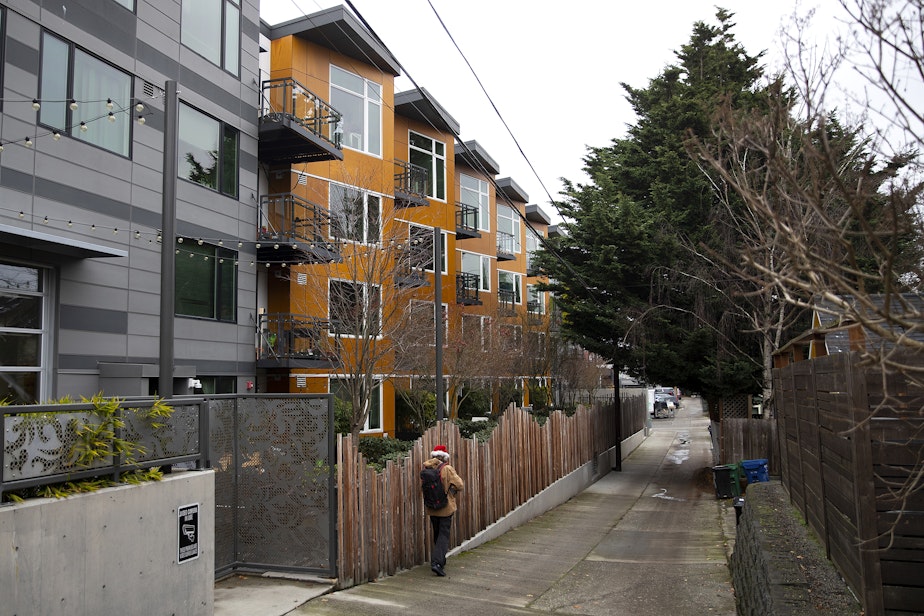
Nigel Moss was a 50-year-old father of three from suburban Portland, who, with his broad shoulders, tan skin, and bald head, bore an uncanny resemblance to Dwayne “The Rock” Johnson. He ran a landscaping business from spring to early fall, and worked for Titans Security in winter.
Moss started at the Janus the first week of October, two months after Bobby died.
“He was the first person to make us feel safe,” said Paleologos, who lived next door.
Moss refused to tiptoe around the woman and her friends.
“You guys know what you’re doing,” he said one evening to people sitting outside the unit. The interaction was caught on tape. “You’re squatting. You cannot live here if you don’t pay.”
“Nothing’s been decided,” a male voice responded. “It hasn’t been to court.”
Five days into the job, Moss got shot.
It was an unseasonably warm October evening, tinged with wildfire smoke.
At 5:45 p.m., a woman shouted from one end of the alley, “Somebody get him! He just threw a rock at a window.”
She was referring to a man in a crimson hoodie and black pants who had rounded the corner into the alley. “Oh shit and fuck,” the man said under his breath, loudly enough for surveillance footage to pick up. He limped as he ran.
Three cameras were pointed at the alley. A second one showed Moss running down the line of patios.
“Hey! What are you doing?” he bellowed.
“I’m running,” the man said. “I hate it. It’s not worth the oxygen.”
The man looks goofy on video, weaving through compost bins, and, at one point, briefly dropping his gun.
Moss opened the back gate and ran into the alley to confront him. A dog started barking. Residents appeared at their windows, holding up their phones to record.
One resident video showed the man and Moss facing each other. The man held a gun, and Moss held up a cannister of pepper spray. It is unclear from the videos if Moss’s gun was in its holster.
“Get down, now!” Moss said.
“Please,” the man said in a whiny voice. “Don’t do this. Please, I’m not doing this.”
Moss got close enough to push the man.
“Turn around!” he said.
When the man doesn’t do as told, Moss sprayed him in the face. The man instantly lifted his gun, shooting Moss four times, including in the jaw. The man then ran down the alley.
McLellan ran out of the building to Moss. Another neighbor was using a belt as a tourniquet on Moss’s leg.
That evening and weekend, residents watched footage of the shooting. They zoomed in on the shooter’s face, but with his cap pulled down, it was tough to discern much.
Still, they wondered if he might be connected to the woman. They speculated that he'd spent time in the unit because they’d recently heard the woman call out a name. Facebook sleuthing revealed a connection between the woman and a man with that name — a man who bore some physical resemblance to the shooter, and who had, according to surveillance footage, worn similar shoes.
Residents shared a photo montage with police, who sent an internal bulletin naming the man in connection with the shooting.
(Moss is expected to make a full recovery, according to his GoFundMe. He declined to comment for this story. The man did not respond to my attempts to reach him.)
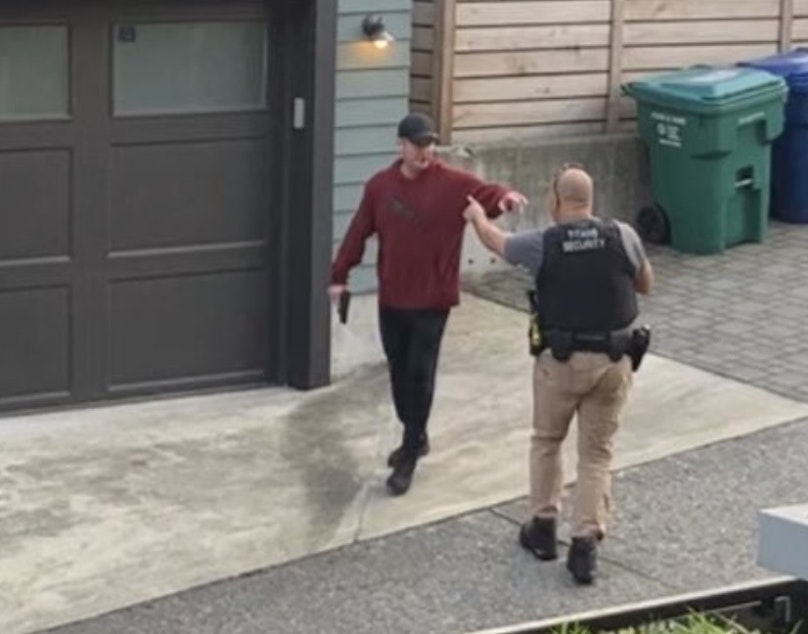
VIII. “He’s not the shooter”
I can’t find the woman, so I go to her mother’s house. She answers the door and invites me in — and shares details that shed doubt on the circulating narrative, including about the shooter’s identity.
Her home is spacious and spotless, with a bowl of fruit on the kitchen counter. She says she doesn’t have much time before her grandson, now a kindergartner, returns home by school bus, but she can talk until then. She says The Big Man died of an overdose shortly before Bobby, and that the woman found him, too. The child moved in with her — a mutual decision between mother and daughter, she says — in part because there were too many people hanging around the Janus.
“She’s taking Bobby’s death really hard,” she says.
It had been a difficult few years for their family, she says. Her husband died two years earlier of an allergic reaction to a medication, and their daughter had watched him die.
“I don’t think she’s grieved the loss of her father,” she says.
I had written the mother a letter, in which I had mentioned squatters’ rights. “What does that have to do with my daughter?” she asks. I tell her about the Seattle Roommate Ordinance, and that her daughter had claimed to be engaged.
“They were engaged,” the mother says. She knew Bobby, she says. He was a nice man. Quiet, and she doubts he would have approved of all those visitors. It was hard on her daughter, too, she says.
She knows the man who was at the apartment with her daughter, and so I ask her about the Janus residents’ theory that he might be the shooter. She looks at me in disbelief. “Who said that?” she asks.
I pull up a video of the shooting and show her. She doesn’t think it’s him. The man she knows is heavier and shorter than the suspected shooter, she says, although it's been four months since she's seen him.
“I would tell you,” she says. “Crime is crime.”
The next morning, I go to see Everlyn Animas at the Janus. I mention that the woman’s mother doesn’t believe the man whose name had been circulated is the person who shot Moss. Without responding, Animas swivels her chair to face her computer.
“I want you to see something,” she says.
She pulls up a photo that Nigel Moss took several days before he was shot, of the man standing in the doorway of Hawran’s apartment. The man looks straight at the camera, looking both sheepish and annoyed. He looks significantly shorter and pudgier than the shooter, just as the woman’s mother had said.
From this angle, he looks nothing like the shooter. Animas says she left on vacation after the shooting, but if she’d been in the office, she would have challenged that narrative.
I ask if she has a number for the woman, and she says I probably have it. The woman took over Hawran’s cell phone, Animas said. (The woman did not return my calls.)
IX. Return to the Janus
After the shooting, the woman left for four days. The residents thought she was gone for good until she walked to the front desk and said, “My fob isn’t working.”
Janus management turned it back on, to the residents’ horror, but they had to: The woman was a tenant under Seattle Roommate Ordinance, even if she was facing eviction.
Meanwhile, the private detective Janus management hired to find Hawran’s family found Bobbie Reagan, his sister, who lives with her husband and horses on 12 acres near Reno, Nevada.
Reagan told the investigator she did not believe her brother and the woman were engaged. The woman was not her brother’s type, she said.
The investigator met with the woman at Hawran’s apartment and asked what it would take for her to leave. The woman said she wanted a moving truck and a modest sum of money — a cash-for-keys situation — according to people in city hall aware of the arrangement.
Janus management agreed, asked her to sign a statement in which she said she hadn’t been engaged to Hawran, and saw her out.
News spread fast. Residents streamed out and congratulated Janus management.
X. An encampment disperses
After the woman left the Janus, the encampment across the street dispersed. The Janus was quiet again.
Moss moved home to Oregon and is recovering. His shooting remains an “active and ongoing investigation,” according to Seattle Police.
The events at the Janus propelled Councilmember Strauss to form a “Greenwood work group” to address contentious areas in the neighborhood. He said it’s been working.
Bobbie Reagan, Hawran’s sister, said she is trying to make sense of her brother’s death and the aftermath.
“It’s a horrible connection to what our society is going through,” Reagan said. “And to have that happen in a place where he and I grew up, but it’s happening everywhere — everywhere.”

